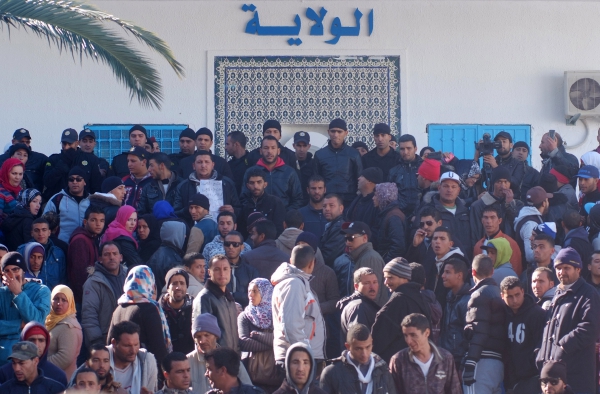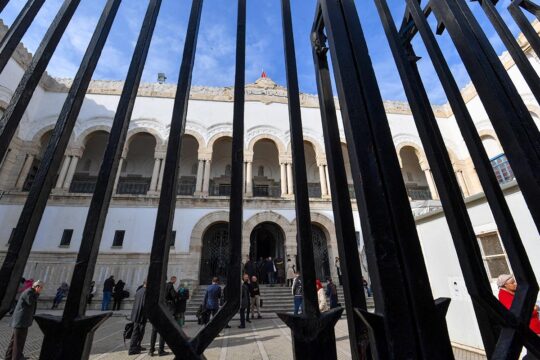Olfa Lamloum is a political scientist and director of the International Alert office in Tunisia. She seeks in her research and that of her team the voice of the marginalized. In April 2015, Alert International published a qualitative survey entitled “Youth and Contraband in Kasserine, Dispossession and the Dynamics of Exclusion”. In this interview, Olfa Lamloum talks about the root causes of the uprising by unemployed people in Kasserine, central-west Tunisia, that started just over a week ago following the suicide of 28-year-old jobless man Ridha Yahyaoui. He died from electrocution after climbing a pylon. Last June, the country’s Truth and Dignity Commission received a request from two civil society organizations to recognize Kasserine as a “victimized region”, which is possible under Tunisia’s transitional justice law.
JusticeInfo.net: Anger has spread to all the marginalized parts of the country after a young jobless man committed suicide in Kasserine, and a curfew has been imposed. Is this again the revolution of five years ago, sparked by the self-immolation of Mohamed Bouazizi in Sidi Bouzid, not far from Kasserine?
Olfa Lamloum: That depends what you mean by revolution. Is this latest social uprising in Kasserine going to take on a political form and provoke change at the highest levels of government? It is a bit early to say. I think we are still feeling the aftershocks of the revolutionary process triggered in December 2010. Demonstrations have continued in the past few years. The demands expressed five years ago have not been addressed by successive governments, and they remain valid in the eyes of the unemployed youth. The government’s fragility is another factor. The élite in power and the political system are still in upheaval. The situation in the region makes things even more complicated, especially the Libyan crisis. We always tend to forget that the “European Spring” lasted 100 years, and the five years since December 17, 2010, is a short time.
JusticeInfo.net: You were recently in Kasserine and Cité Ettadhamen, in the marginalized suburbs of Tunis. Did you pick up warning signs of this latest unrest?
OL: The three surveys we carried out (“Youth and Contraband in Kasserine”, “Security and Border Control seen by the People of Kasserine” and “The Youth of Douar Hicher and Cité Ettadhamen, a Social Study”) say more or less the same thing, revealing how poor population groups and interior regions of our country have been marginalized. Firstly, four or five years on, governance policies with regard to poor populations have not changed fundamentally since the fall of Ben Ali. Secondly, aspirations for more integration, dignity and equality of opportunities are as strong as ever. Thirdly, successive governments put in place since the start of the democratic transition have produced only disappointment and disillusionment among these people, who live in unbearably difficult conditions. On the ground, we found a strong feeling of injustice and a lot of anger. These feelings were also behind the uprisings of December 2010 to January 2011.
JusticeInfo.net: Poverty is prevalent in Kasserine. What forms does it take and what are the reasons behind it?
OL: The poverty and marginalization of this region are reflected in the statistics. Unemployment is very high, nearly 30% of the active population. The most striking finding of our survey on “Security and Border Control seen by the People of Kasserine”, covering 500 young people aged over 18, is the high rate of illiteracy in our sample (37%). Almost half of those interviewed did not finish their schooling. 66% have no social security cover, which is an indicator of vulnerability and fragility. More than 16% work on construction projects set up under Ben Ali and maintained after the revolution to try to contain social unrest but without effectively combatting unemployment. They are a sort of cheap fixed-term contract providing just enough to survive and no social security rights. Employees are paid 249 Dinars [110 euros], which is below the minimum wage. Despite this explosive situation, those interviewed said there have so far been no policies putting employment as the priority of government strategy. There are only short-term policies to contain anger, and yet Kasserine made the highest sacrifice in terms of dead and injured in the revolution.
JusticeInfo.net: What do you think of civil society organizations’ request that the Truth and Dignity Commission recognize Kasserine as a “victimized region”?
OL: I think the filing of this request to the Truth and Dignity Commission is a strong gesture for at least two reasons. First it shows these regions are not forgotten by a civil society fighting for social rights and democracy for everyone, including the poorest. It also shows that marginalization, discrimination, exclusion and dispossession don’t just happen by chance, they are the result of a system that we have the right to question and judge as part of the transitional justice process. In Kasserine, the infrastructure, urban planning and public spaces are terrible! Imposing a curfew almost makes people there smile. “Curfews are not new here,” they say. “Have you seen anywhere in this town to go out at night?”






